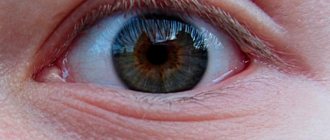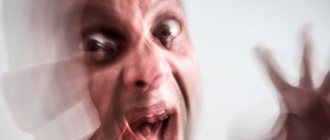In the system of modern international classification of diseases, there is no such concept as “psychopathy” - it was replaced by the term “personality disorder”. Experts believe that this definition is more suitable to describe this disease, which is characterized by persistent personality deformation, distortions of internal perception and thinking. Psychopathy is less common in men than in women. However, in representatives of the stronger sex, the pathology manifests itself at an earlier age, is more severe and is quite difficult to treat. The complex therapy offered by the doctors of the Leto mental health center makes it possible to achieve stable, long-term remission and socialization of the patient.
Excitable type of psychopathy (explosive psychopathy)
The excitable or explosive type of psychopathy occurs predominantly in boys and first appears most often during the first biological crisis between the ages of 2 and 5 years. Children experience the following symptoms: excessive excitability, increased motor activity, aggressiveness, malice, capriciousness. Motor and affective discharges are accompanied by pronounced vegetative manifestations. The mood background is unstable: elevated mood is often replaced by a dysthymic mood with tears and whims. In preschool age, such children have difficulty adapting to kindergartens, beat children, and react with protest to comments. At school, gymnasium, lyceum and family, they constantly violate the regime, conflict with others, leave classes and leave home. Dysphoria, drive disorders, and asthenic symptoms are also noted. In the development of the excitable type of psychopathy, perinatal encephalopathy, residual organic pathology, and constitutional and hereditary factors are important.
Clinical picture
Personality disorders are not accompanied by pronounced neurological symptoms, with the exception of cases when the cause of the pathology is organic brain damage. Therefore, the diagnosis is made based on the characteristics of a person’s behavior, socialization skills, and interpersonal relationships.
Depending on the clinical manifestations, there are several forms of psychopathy in men:
- asthenic;
- anancaste;
- schizoid;
- paranoid;
- dissocial;
- emotionally unstable;
- hysterical.
Epileptoid type of psychopathy (epileptoid psychopathy)
The onset of epileptoid psychopathy usually occurs in prepubertal age. However, sometimes even preschoolers already exhibit pedantry, excessive accuracy, thoroughness, and viscosity. Any discomfort or infringement of rights causes violent affective and motor reactions. An angry mood, unlike excitable psychopathies, lasts a long time. Children are usually vindictive. At school age, children develop more pronounced egocentrism, a desire to fight for order, and an unfriendly, hostile attitude towards people around them.
Main forms of the disease
There are two variants of the course of the disorder:
- Impulsive. The predominant symptoms are emotional instability and lack of self-control. Outbursts of aggression and anger usually occur in response to condemnation of the patient's actions by others.
- Borderline. A more severe form of pathology, in which lability of mood and behavior persists almost constantly. Over time, against this background, a tendency to self-harm develops.
Unstable type of psychopathy (unstable psychopathy)
The unstable type of psychopathy most often manifests itself in prepubertal age. Such children exhibit weakness of will, volitional delays, increased suggestibility, instability of interests, superficial judgments, frivolity, increased desire for pleasure, and a thirst for new experiences. Children do poorly at school, quickly fall under the influence of specific asocial companies, leave home and school, wander, smoke, drink alcohol, and use drugs. In companies they always play a subordinate role. Unstable psychopathy is often based on psychophysiological infantilism.
Diagnostics
Diagnosing psychopathy is quite difficult. To do this, you must have special medical knowledge. The patient is observed by a doctor for a long time, which makes it possible to identify pathological changes in personality and eliminate errors in education. Psychiatrists and therapists use various techniques in their work to identify deviations from the norm. A test developed by Robert Hare helps to identify pathology such as psychopathy in men. This psychiatrist identified twenty main criteria that allow us to assess a person’s condition.
Psychopathy is often irreversible, but with timely consultation with specialists, the situation can improve. If a teenager has been diagnosed with a similar pathology, then psychotherapists and special teachers work with him, and if necessary, medication can also be prescribed.
Hysterical type of psychopathy (hysterical psychopathy)
Hysterical psychopathy clearly manifests itself at puberty. The hysterical type is often characterized by the desire to achieve recognition by any means, to be visible and in the center of attention. The hysterical type is more common in girls. Some hysterical traits can appear even in preschool age. Girls strive to stand out with their clothes, command other children, perform at matinees and school events, and listen to praise. At school age, the desire to be first intensifies, pronounced selfishness appears, ignoring the interests of other children, and jealousy of the successes of classmates. Emotional reactions can be very vivid, and behavior can be demonstratively theatrical. To gain recognition, children can use intrigue, slander, fantasies, fiction and some of their unusual adventures or secrets. In adolescence, demonstrative suicide attempts and participation in extravagant groups (emo, rockers, bikers, metalheads, etc.) may be observed. In the origin of hysterical psychopathy, upbringing according to the type of family idol, hereditary and constitutional factors play a role.
Symptoms
The clinical picture of unstable psychopathy is characterized by the following manifestations:
- Changeable mood. Periods of dysphoria, anxiety and irritability usually last several hours (less often - days) and are sharply replaced by general elation, energy, and emotional arousal.
- Constant internal feeling of emptiness, abandonment.
- Inadequate reaction to any conflict situations. A person is not able to control his own emotions. For example, in a fit of anger, he can provoke a fight, injure himself, or break something.
- Episodes of depersonalization. In certain psychotraumatic situations, the patient has a feeling of unreality of what is happening, as if he sees himself from the outside.
- Pickiness.
The following symptoms are also possible:
- Formation of delusional ideas against the background of severe stress.
- Auto-aggression, the desire to cause harm to oneself (and not only physical). For example, unwise spending of money, petty offenses, indiscriminate choice of sexual partners.
- Eating disorders.
- Suicide attempts, hints or direct threats to commit suicide.
With unstable psychopathy, the tendency to impulsive, rash actions is clearly manifested. A person is not even capable of short-term planning, which makes full-time employment or building serious relationships impossible.
As a rule, acute manifestations persist for 4–6 years from the moment of manifestation of the disease. The patient's behavior then changes, which is often mistaken for remission or recovery. But the disorder simply goes into a chronic stage, for which the following symptoms are typical:
- chronic depression with pronounced apathy, melancholy, indifference to family, work, friends;
- constant feeling of anxiety, despair, guilt, inner emptiness;
- intolerance of loneliness, but at the same time a person “with hostility” perceives any attempts at care and help;
Attacks of anger become less frequent, which is associated with the fact that the patient has learned to relate his behavior to society. But at the same time, carefully hidden emotions become the cause of constant internal tension and anger, which further worsens the psycho-emotional state.
Psychasthenic psychopathy (anxious-suspicious psychopathy)
Children with the psychasthenic type of psychopathy are characterized by anxiety, uncertainty, and suspiciousness. Such children often develop fears and obsessive states. They do not tolerate large psycho-emotional and stressful loads, separation from parents, relatives and relatives, and do not adapt well to a new team. At school, they usually study below their capabilities, because due to uncertainty they are not active and do not have time to complete independent work or tests on time.
Causes
There are no exact reasons for the development of the disease. Psychiatrists agree that it is associated with:
- genetic characteristics of a person;
- violations of the education system;
- organic brain damage in childhood.
From their parents, children can inherit increased emotionality, strong impressionability, and an inability to focus on little things. Brain disorders that lead to illness are most often birth injuries, as well as brain damage that occurred during pregnancy or in the first years of life.
There is an opinion that people suffer from hysterical psychopathy due to mistakes made by their parents during the upbringing process. Thus, it is bad if a mother or father instills in a child from an early age attitudes indicating that not everyone can be significant. Classifying people into important and “minor”, they talk about gender and social status. Because of such ideas, in adulthood a person feels inferior if he does not correspond to some parental guidelines.
Schizoid psychopathy (austic psychopathy)
Children with schizoid psychopathy already at an early age exhibit developmental dissociation, which consists of advanced speech, mental and intellectual functions against the background of delayed development of psychomotor skills. Children usually begin to read and count early, and are interested in non-childish and abstract problems. Subsequently, their hobbies may be of an extremely valuable and highly specialized nature. At the same time, their motor skills are inhibited, children master self-care skills late, and do poorly in labor and physical education classes. Children with schizoid psychopathy do not participate in noisy games and do not feel the need to communicate with peers. Emotional coldness in such children is combined with sensitivity. Unlike schizophrenia, they do not have progression and mental disorders.
Why the disorder needs to be treated
Trying to stand out from others, the psychopath at some point begins to deceive himself. Self-deception often reaches an exaggerated degree. It comes to the point that a person is convinced that he is right, even if he has committed an illegal act, humiliated or insulted someone. It often turns out that thieves, murderers, and maniacs suffer from hysterical disorder. It is because of him that they do not think that they are doing anything wrong.
The disease contributes to a decrease in sexual desire and the development of various somatic pathologies. Often against its background there are:
- fever;
- feeling of a lump in the throat;
- movement disorders;
- stomach ache;
- nausea;
- migraine.
Physiological symptoms are the result of neglected psychosomatics. The nervous system begins to malfunction due to progressive mental disorder. Erroneous signals are sent to the internal organs, which creates the preconditions for pain and general ailments.
Treatment of psychopathy
Comprehensive treatment of psychopathy makes it possible to normalize the development of a child’s personality. Treatment depends on the type of psychopathy and the age of the patient.
There are contraindications. Specialist consultation is required. Photo: Poznyakov | Dreamstime.com \ Dreamstock.ru The people depicted in the photo are models, do not suffer from the diseases described and/or all similarities are excluded.
Related posts:
Headache in children, treatment, how to get rid of it, how to relieve it
Acalculia, dyscalculia, treatment of acalculia
Stuttering in children, stuttering treatment in Saratov, Russia
Neuroses in children, childhood neurosis, treatment of neuroses
Enuresis, treatment of enuresis, how to treat nocturnal enuresis in Saratov, Russia









